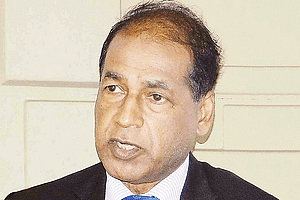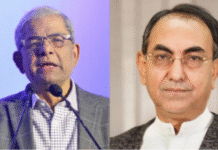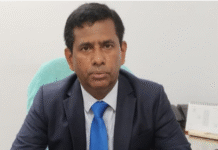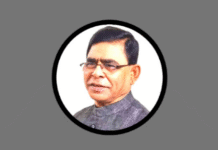
Professor Muzaherul Huq, former WHO consultant for Southeast Asia region and former director of the Centre for Medical Education in Bangladesh, was granted an honorary fellowship from IAS of India for his contribution to developing medical care in Southeast Asia. He is also former senior advisor of the World Federation for Medical Education. This medical expert speaks at length to Prothom Alo about the tackling the second wave of coronavirus.
There had been talk of a second wave of coronavirus for quite some time but the government was hardly prepared. Quite a lot of damage has been done already. What can be done now to minimise damages?
It is true that the government hardly had any preparation. It must be realised that this is a pandemic and worldwide. Just as it has no limits, there is also no effective drug to cure coronavirus. The World Health Organisation (WHO) has certain recommendations or guidelines for all countries including Bangladesh, to tackle it. There could be not just a second wave, but a third wave too.
WHO informed all the countries including Bangladesh about coronavirus in December 2019. After that, guidelines were sent to all countries about tackling coronavirus. The countries set their strategies accordingly and began to prepare. We prepared with only one lab at IEDCR for our population of 170 million (17 crore). So the inevitable took place. One good thing is that even though the government has not admitted its mistakes, at least now sample testing is being carried out in many places of the country. The government has managed to tackle the first wave, but did not take adequate preparation for the second wave. The number of coronavirus cases and deaths are on a steady rise.
The second wave of coronavirus has commenced and no one knows when it will stop. Can the harm be lessened to an extent?
It is possible to lessen the harm. The government has to formulate a strategy. The government must immediately provide the nation with a strategic plan. This will give details of what the government and the people must do. Awareness is priority but it is not everything. Public awareness must be mobilised. People are aware about the harm of smoking, extremely aware, but smokers still thrive. WHO had advised to involve the people. The government has completely failed to do this
They took advance preparations. They proceeded with strategic plans. They adjusted their strategies as needed and were successful.
Do you think the government is doing what it should in this regard?
No, it is only partially doing what it should. It is not proceeding in a planned manner.
Are the people being properly included in the process?
WHO’s advice had been to involve the people, but the government has completely failed here.
So what should the government do now?
The government’s immediate target should be to involve the people, only then it may be possible to make any progress in controlling coronavirus. The government must fix a strategy and go ahead according to plans, involving the people.
There is a lack of coordination among the government’s agencies and institutions. An officer of the Directorate General of Health Services (DGHS) has said that everything is not in their hands.
The government may not admit it, but the people can see the lack of coordination. The medical college admission examination and the book fair are glaring examples. Give the responsibility of controlling coronavirus to the district surgeons. Make them accountable. Controlling coronavirus will be successful then. Assist them, cooperate with them. The civil surgeons will also be in charge of coordination.
Last year experts came from China and gave some recommendations, but those remain idle. The new director general of DGHS hasn’t even read the recommendations. No one has even briefed him about the matter.
The recommendations made by the experts from China should have been taken into consideration. They have been successful in bringing corona under control. But taking advice and actually taking decisions is not one and the same. There is no obstacle to taking a decision based on these recommendations in keeping with our circumstances and abilities.
Bangladesh received the first dose of the vaccine in time. This is being seen as a success of the government. But do you think there is uncertainty in receiving the second dose?
So far no uncertainty has arisen, but the government must ensure that the second dose is received in time.
The UK variant of coronavirus has caused concern among the people in Bangladesh. Many persons returning from the UK have contracted coronavirus.
I feel there is no reason for us to be alarmed over the UK variant of coronavirus. After all, the AstraZeneca vaccine is effective against this.
What would your advice be to the government right now?
I have three recommendations for the government. 1. Involve the people in the government programmes. 2. Take up a correct strategy to control corona. 3. Ensure herd immunity. If a proper strategy can be adopted in the battle against corona, it can be brought under control. The faster we can do this, the more lives we can save.
The government has declared a lockdown from Monday to tackle the second wave of coronavirus. How do you view this decision?
Just enforcing a lockdown is not enough. And why around the entire country? That is not scientific. The lockdown should be enforced to restrict people’s movement. It is justified to enforce lockdown in areas where the incidence of coronavirus is high so that it does not spread to other areas. But locking down the entire country is not scientific. There is no need for lockdown in areas where the incidence of coronavirus is less. Lockdown shuts the door on means of earning for people of the working class.
*This interview appeared in the print and online edition of Prothom Alo and has been rewritten for the English edition by Ayesha Kabir









